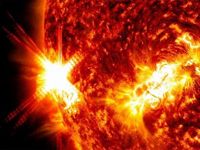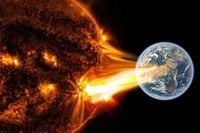As the world turns its gaze skyward, a series of magnetic storms are set to affect Earth from March 28 to March 31, 2025. These storms, caused by solar activity, have the potential to influence atmospheric pressure and affect the well-being of those sensitive to weather changes.
According to a forecast by the Space Weather Prediction Center (SWPC) of NOAA, the geomagnetic activity during this period will vary significantly. On Friday, March 28, a strong magnetic storm is anticipated with a K-index of 6, classified as a red level. This level of activity can induce headaches, fatigue, and stress in weather-sensitive individuals.
On Saturday, March 29, the K-index is expected to drop to 4, signaling a moderate magnetic storm. By Sunday, March 30, the K-index will further decrease to 3, indicating a weak storm, and finally, on Monday, March 31, a K-index of 2 will suggest a return to calmer conditions.
The fluctuations in geomagnetic activity are primarily due to coronal mass ejections (CMEs) that occurred earlier in the week, specifically on March 25 and 27. These ejections release significant amounts of solar energy, resulting in charged particles that travel toward Earth, impacting its magnetic field.
Interestingly, while the SWPC has noted the potential for a strong storm on March 28, forecasts from the British Geological Survey Geomagnetism indicate that the solar wind should return to background levels over the weekend. They predict that geomagnetic activity will peak at a level classified as STORM G1 on March 29 and 30, but they do not foresee significant disturbances affecting Earth during this time.
Despite the varying forecasts, experts emphasize the importance of monitoring solar activity closely. The K-index is measured on a scale from 0 to 9, with 5 and above indicating a strong magnetic storm. The G-index, which characterizes storm intensity from 1 to 5, corresponds to the K-index when you add 4. For instance, G1 storms relate to a K-index of 5.
As these magnetic storms approach, it is crucial for those affected by weather changes to take precautions. Experts suggest maintaining a balanced routine, which includes getting adequate sleep, staying hydrated, and eating light meals. Avoiding spicy, salty, and fatty foods, along with reducing caffeine and alcohol intake, can help mitigate symptoms associated with magnetic storms.
For those who feel the effects of these geomagnetic disturbances, common remedies can alleviate symptoms. Engaging in light physical activity, enjoying fresh air, and avoiding stress can significantly improve one’s well-being during these turbulent times. Additionally, a contrast shower in the morning can invigorate, while a relaxing bath in the evening can help unwind.
It is also important to note that there are no specific medications for the symptoms caused by magnetic storms. However, individuals with chronic health conditions are advised to rest more and keep necessary medications on hand. The fluctuating nature of solar activity means that these storms can change rapidly, making it essential to stay informed about the latest forecasts.
As we head into the weekend, the interplay between solar activity and geomagnetic storms continues to be a topic of interest for scientists and the public alike. The potential for auroras during high-level storms, particularly those reaching a K-index of 7 or 8, adds an element of excitement for skywatchers. However, the reality of these storms also serves as a reminder of the delicate balance between solar activity and life on Earth.
In summary, the upcoming magnetic storms from March 28 to March 31 are expected to vary in intensity, with a strong storm on the 28th followed by moderate to weak storms over the weekend. Those sensitive to weather changes should take precautions to manage their health during this period. As always, staying informed about solar activity can help individuals prepare for and respond to these natural phenomena effectively.



